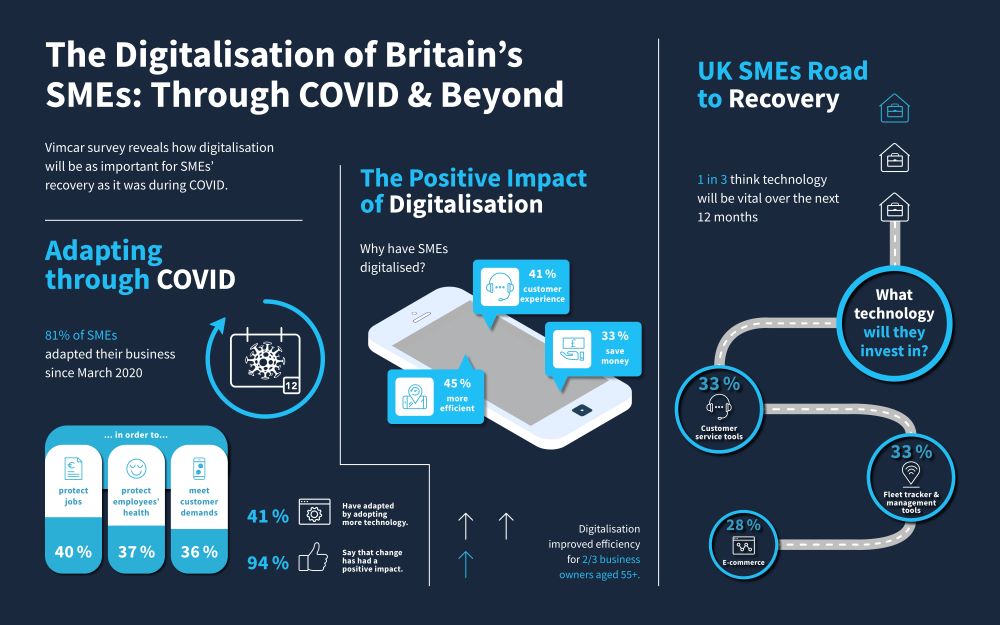UK SME businesses prioritised people as well as profit during the pandemic

Research from Vimcar, conducted by Opinion Matters, today reveals a picture of how UK SMEs that own company car vehicles adapted to uncertainty and economic pressure during the Coronavirus lockdowns, what they focused on to ensure their survival and how they see their future roadmap to recovery panning out.

Source: https://vimcar.co.uk/resources/road-to-recovery-uk/
The data reveals that 81%* of UK SME businesses surveyed say they have had to adapt their businesses since March 2020. 2 in 5 (41%) of those that have had to adapt, have done so to protect jobs.
Although just under third of companies polled have had to adapt to stay afloat (30%) and over a third to protect their profitability (38%) since the start of the Coronavirus pandemic, retention of staff remained a focus with 37% of businesses surveyed saying they did so to protect their employees’ mental and physical wellbeing.
A further 36% adapted to meet customer demand, with a quarter of companies surveyed (25%) having to increase their fleet size to meet this, and close to a third of companies polled (29%) relied more on local custom, with businesses in the West Midlands (37%) leading the way with looking closer to home for customers.
Digital driving SME recovery
Of the UK businesses that have had to adapt, making the digital shift has been a driver for SMEs with 41% saying that they had to adopt more technology within the business. Those SMEs who adapted did so across the following areas: increasing their digital presence (39%), increasing the number of cashless payments (38%), relying more on social media (35%), and 30% turning to a digital platform to manage their company vehicles.
As more of the UK has turned to online shopping during this time, investing in ecommerce technology to impact future growth is obvious and businesses in the South West (41%), the North East (38%) and Greater London (35%) are the top three regions committing to that, whereas SMEs in
The North West (28%), the East Midlands (25%) and Scotland (25%) are least likely to be focused on securing online customers. 45% of those surveyed said being more reliant on technology since March 2020 has made their business more efficient and 33% have saved money as a result.
Looking ahead to the roadmap to recovery
However, this evolution does not come without its challenges, and it is no surprise that Coronavirus restrictions rank as the number one obstacle (32%) the businesses surveyed will face over the next 12 months. Brexit regulations (23%), financial challenges (25%), and high standards of customer expectation (24%) are also top reasons for concern. And these worries seem to be the backdrop to SMEs’ outlook when it comes to business growth over the next 12 months with only 30% of businesses surveyed feeling optimistic about their growth in the next 12 months.
On a more positive note, the shift to digital does not seem to be fazing UK SMEs, with over three-quarters (77%) of those surveyed not considering technology issues as a major concern moving forward.
When they adapted and the difference it has made
The data reveals that 45% of respondents made the most changes after the first lockdown, between June and August 2020, followed by over a third (34%) between September and December 2020.
94%* of SMES polled say the impact of technology on their business has been positive since March 2020. This has been particularly true for business owners 55 years old and above, with just under two-thirds (65%) of them confirming that being a more digitally driven business has improved the efficiency of their services.
And there does not seem to be any going back for these businesses: investment into the best technology is going to be an increasingly important way for companies to overcome challenges in the next 12 months. 39% of respondents confirmed that commitment, with the North West making the top spot with almost half of businesses in the region (48%) continuing to adopt tech to impact growth.
Ronald Clancy, UK Country Manager, Vimcar comments on the research: “2020 was a unique year that has changed the way businesses function forever. This data shows us just how resilient and adaptable UK SMEs have had to be to ensure the continuation of their businesses – how agile and innovative they have been, and how they turned to technology to enhance their businesses to ensure they weathered the storm.
This research reveals how SMEs took a hybrid approach – investing in technology and their people – and just how much SMEs were a part of the digital shift that occurred during lockdown.
When we look to the future and the roadmap to recovery, despite the vaccination programme and the promise of unlocking of restrictions, there are still challenges ahead, but it is positive to see that the integration of technology is an ongoing commitment for these businesses and seen as critical for their future success.”
With 41% of UK businesses polled having adopted more technology, the data revealed its application has been to support people…:
- 40% introduced internal communications or employee engagement software
- 35% introduced new HR software
- 34% internal comms and employee engagement
…and to improve their business operations.
- 43% introduced new customer communications platform
- Over a third (34%) introduced an ecommerce offering to support their business.
- 46% introduced vehicle management software, e.g. vehicle tracking or fuel management software
This survey was conducted by Opinion Matters, among a sample of 1001 senior decision makers in companies with up to 249 employees owning vans/vehicles. Fieldwork was carried out between 19th – 26th May 2021. Opinion Matters abides by and employs members of the Market Research Society which is based on the ESOMAR principles.
*81% calculated by inverting 19% of respondents who said no departments had to adapt since March 2020.
*94% calculated by inverting 6% of respondents who stated that being more tech and digitally reliant since March 2020 hasn’t positively impacted their business.




